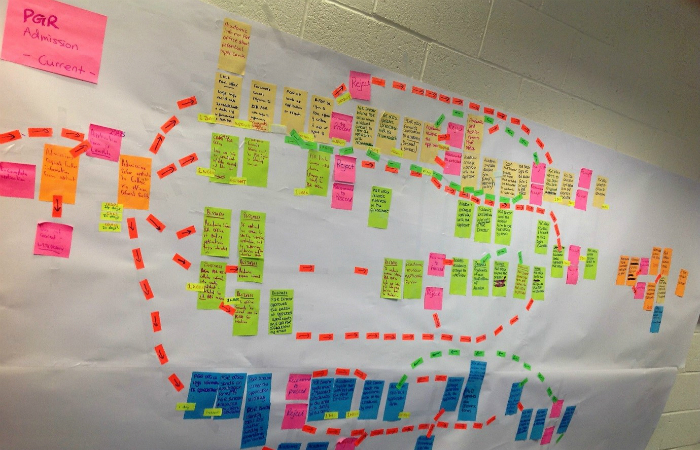Postgraduate admissions at Brunel University London have plunged by 48% since 2013/14 so Brunel took action to change how prospective PhD students apply. Jeung Lee says their new process should cut application times by over 50%.
The College of Engineering, Design and Physical Sciences at Brunel conducted a preliminary study into the issue. They observed that the time for reviewing a PhD application was excessive and concluded that this might be contributing to a loss of qualified applicants to other universities, who may be able to provide offers more quickly.
In response, a team was assembled to undertake a 3-day Rapid Improvement Event (RIE) to redesign the process for PhD admission. The team comprised three college PhD programme managers, eight postgraduate research directors from all three colleges and members of the central admissions team.
Their brief was to deliver a standardised PhD admission process which would increase visibility and transparency using lean principles and reduce the number of days required to review an application and make an offer.
While three days was a large time commitment, this was definitely worthwhile.
Improvements made but still some problems
Once the processes were mapped out, the team identified that after the new application system came into place in October 2016, it improved the efficiency by reducing the times to two thirds for a successful offer to be made – but there were still problems.
For example, there were a number of variations of practices across academic departments, leading to an inconsistent approach to the admissions process, the system was very labour-intensive and lacked visibility – there was no technical capability to track an application, and monitoring was done manually and recorded in spreadsheets maintained by the college PhD programme offices.
Also, the central admissions team was ‘in the dark’ once an application was reviewed by a college. The college PhD programme offices also did not have an immediate access to the status of applications. This meant that no appropriate intervention could be made to expedite the process.
It became clear that the process needed to be redesigned, and the contribution from the academics was key to this. From the start, the academics suggested that the application system should be tailored to PhD admissions and provide ‘fast track’ services for applicants who have discussed their research projects with potential supervisors or whose applications are restricted by their funders.
They also emphasised that instead of rejecting qualified applications due to the mismatch of the research areas, the new process should enable them to refer applications to other department(s). Observing the various practices across the departments, they started to work together to develop a university-wide admissions process.
Time invested pays dividends
Reflecting on this experience, Dr Claire Donovan, reader in health economics, said: “While three days was a large time commitment, this was definitely worthwhile.
“The RIE allowed participants to gain the ‘big picture’ view of the systems and processes for PGR admissions across the whole university, and to learn the viewpoints and perspectives of the full range of stakeholders involved. We were also able to pick up on best practice in different areas, and reflect on how to improve our own approaches.”
The central admissions team promptly responded to the requests to revise the application system, to ensure the right information is captured at the initial stage, thus speeding-up the process of screening applications and allocating potential supervisors.
After their brainstorming session, the team agreed to develop an internal tracking system, using eVision, a web-based interface managed by the student record system.
 The internal tracking system is expected to replace the manual spreadsheets and academics’ decision forms, providing easier access to applications. It will enable academics to refer applications within and outside a college. With its dashboard function, both the local college and central teams would be able to view the status of PhD applications and follow up pending tasks more efficiently.
The internal tracking system is expected to replace the manual spreadsheets and academics’ decision forms, providing easier access to applications. It will enable academics to refer applications within and outside a college. With its dashboard function, both the local college and central teams would be able to view the status of PhD applications and follow up pending tasks more efficiently.
The new process is expected to bring the following benefits:
- Minimise delays and inefficiency in the application process
- Manage expectations from all stakeholders with clear roles and responsibilities including keeping applicants engaged
- Ensure fairness, transparency and compliance
- Ensure better utilisation of resources: the tracking system can save up to £50,500 of the administrative cost per annum.
It should cut application times by over 50%.
Brunel hopes that by making the PhD application process clearer and more concise, they will see a steady increase in the number of applications they receive in the coming years.








